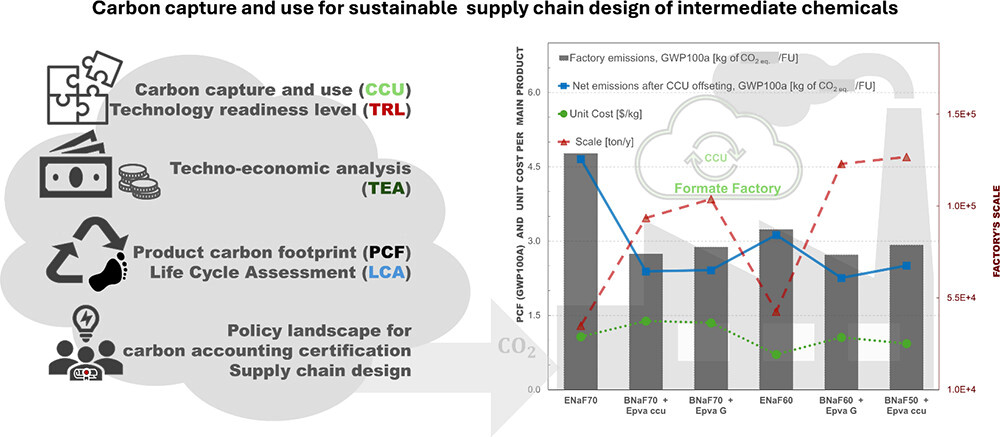A major collaboration between Procter & Gamble (P&G)
and Durham University and Newcastle
University in the UK has yielded a new framework
that supports industrial decarbonization of chemicals in the consumer goods
sector, through the use of captured carbon as a feedstock.
The research asserts that using carbon
capture
to valorize industrial flue gases — the byproducts of burning fuel in
industrial processes such as power generation and manufacturing — into products
is a win-win for lowering costs, diverting climate-changing emissions and decarbonizing consumer products.
Lower-impact, circular chemical production
The P&G-Durham-Newcastle partnership builds on the work of the Flue2Chem
project
— a two-year program in which P&G, BASF, Unilever and 12 other
organizations worked to develop a new value chain to convert industrial waste
gases into sustainable feedstocks for consumer products.
This latest, 18-month partnership has produced a robust tool that enables
chemical manufacturers to assess and compare existing and emerging technologies
based on environmental impact, economic viability and alignment with policy. The
framework integrates lifecycle
assessment
(LCA), technoeconomic analysis (TEA) and regulatory
considerations
to help businesses make informed decisions about low-carbon manufacturing
routes.
 Image credit: ACS Sustainable Resource
Management
Image credit: ACS Sustainable Resource
Management
“This framework empowers stakeholders to evaluate low-carbon options and make
strategic decisions about which technologies to scale,” said Professor Nalan
Gulpinar from Durham
University Business School, who led the research team. “The collaboration also
supports the development of sustainable products for the global market.”
Industrial decarbonization requires a holistic approach that includes supply
chain design, TEA and LCA to drive the transition toward a low-carbon future.
CO2 emissions can be upcycled
into chemical feedstocks for everything from
apparel,
auto
parts,
carbonated
beverages
and detergent (P&G has already explored the use of captured carbon in its
Tide
brand) to
footwear,
fuel,
personal-care
products,
plastics
and more. The study asserts that scaling sustainable supply management by upcycling CO2
into chemical feedstocks across industries can be particularly impactful: For example, turning flue gases from
steelmaking into feedstock could mitigate up to 2.4 percent of greenhouse gas
emissions in the UK alone. The research also underscores the importance of
integrating low-cost, clean sources of
electricity
and
hydrogen
into manufacturing systems to maintain profitability.
“Making sustainable chemicals profitable will be key to growing manufacturing
while achieving industrial decarbonization,” said Newcastle University Professor
Elizabeth
Gibson. “This
work shows how that ambition can be realized.”
An impactful collaboration model
The project was delivered through a Knowledge Transfer
Partnership
(KTP) — a UK-wide scheme in which businesses form strategic partnerships
with academic institutions to develop new products or services, expand markets,
and improve efficiency or organizational performance to address core strategic
challenges — co-funded by UK Research & Innovation
through Innovate UK and P&G. The ongoing success of
KTPs reflects the potential of academia
and industry working together to solve complex global challenges.
P&G and Durham first began collaborating in
2023,
when Durham researchers teamed up with the consumer goods giant to bring new
synthetic capabilities to P&G’s Newcastle Innovation Center.
"Improving supply chain knowledge is increasingly critical in today’s world, and
having a sound methodology in support of more sustainable sourcing is key,” said
Ian
Blakemore,
Knowledge Transfer Adviser at Innovate UK Business Connect. "This unusual
project delivered this in a relatively short time — demonstrating that KTPs are
an excellent way of delivering improved understanding, supporting change in
complex systems."
The future of sustainable manufacturing
This partnership demonstrates how academic expertise, when combined with
industry insight, can shape the future of sustainable manufacturing.
Initial findings of the carbon-captured chemicals study are now published in
ACS Sustainable Resource
Management, with
further publications planned. The team says the research is already influencing
innovation across the chemical manufacturing sector.
Get the latest insights, trends, and innovations to help position yourself at the forefront of sustainable business leadership—delivered straight to your inbox.
Sustainable Brands Staff
Published Jun 13, 2025 8am EDT / 5am PDT / 1pm BST / 2pm CEST